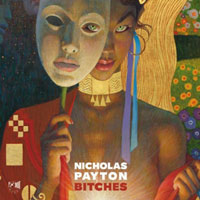Fringe Beat
Voices Carry, and Lift
HALLELUJAH FOR THE CHORUS: There are points in the concert season when the beauty and majesty of tautly-gathered voices goes public, in batches. Local fans of choral and “serious” acappella vocal music—and it’s a large and growing crowd—happily bathe in the plenty. It happened just before Christmas, when we benefitted from the inspirations of the powerful UCSB Chamber Choir’s Scandinavian concert and the ever-compelling early meets early-channeling new music Quire of Voyces in St. Anthony’s Seminary Chapel within a week, framing a captivating local appearance the landmark renaissance male ensemble, Tallis Scholars, at Our Lady of Sorrows.
Once again this weekend, as if by cosmic or calendaric design, a threefer set of recommended choral/vocal concerts descends on us, this time highlighted by a return visit from the grand and internationalized sensation Anonymous 4, at the Lobero on Monday. Over the weekend, Santa Barbara groups of note take up the charge: the Santa Barbara Choral Society continues its still-new “Masterworks at San Roque” series of concerts (representing the Roque, my home turf). Joined by the Westmont College Choir (which, incidentally, joined the pack of impressive Christmas period choral festivities in December, at First Presbyterian Church), performing a program featuring Maurice Durufle’s Requiem, and a west coast premiere of Rollo Dilworth’s The Rain Sequence.
The Nathan Kreitzer-directed Quire of Voyces puts on its pre-spring show, the “Cathedral Classics Concert,” focuses on settings of the Psalms, from such composers as Tallis and Palestrina. Michael Eglin, a composer-in-residence with the group, will premiere another in what has been a series of impressive new choral scores.
Anonymous 4 has, thankfully, made Santa Barbara a part of its performance map for many years, and memorable past appearances have included the Lobero, at the Casa Maria retreat in Montecito and even at the Live Oak Festival in 2009, in a special Americana-flavored project with Darol Anger. Monday’s performance, titled “Anthology 25,” is a special event in the American group’s continuing saga. Here, they sweep across the long and rich discography built up in their now quarter-century association with the harmonia mundi label. Expect some historical/stylistic whiplash of the sweetest kind, as they perform Hildegard von Bingen, plenty of the Renaissance music that is their heart and soul, a new piece by David Lang, a pinch of Jon Tavener and treats from their American music-celebratory Gloryland. It promises to be a not-to-miss evening, for vocal music buffs and beyond.
FRINGE PRODUCT: In the esoteric but passionate netherworld of the jazz scene, and tendril neighborhoods thereto attached, the great trumpeter Nicholas Payton has been stirring up trouble and dialogue in the blogosphere. Unhindered by false modesty, he claims hegemony in the jazz trumpeter sweepstakes and rails against various perceived and actual foes, not to mention taking to task the very term “jazz,” as an extension of the derogatory early term “jass” (as in “jive ass” music).

His interweb fury, and the rancid ping pong it has inspired, stems from the radical twist in his current musical life. Payton’s new album, Bitches, really more of an artful new school/old school R&B concept album than a jazz record, was infamously rejected by his existing label and finally just released on the German In & Out label.
From the title to the exotic painting on the cover, and the essential outspoken brashness of this man with a horn, Payton is paying homage to Miles Davis, and his groundbreaking early electric period album Bitches Brew. But comparisons more or less end with the externals. Miles’ Bitches was a milestone, experimental and even avant-garde in its way while locked into a rock/funk groove machinery appreciable by pop, soul and rock fans. Payton’s Bitches leaves the jazz and experimentalism in the margins. Jazz can wait: this is a sophisticated R&B epic.
Payton himself overdubbed all the record’s instrumental parts, ala ‘70s-era Stevie Wonder or Prince at various points, and sometimes reveals natural comparisons to R&B mavericks like D’Angelo and Shuggie Otis. But he does it his own way, and Bitches is an ambitious concept album about love’s bliss and angst, an mythologized Adam and Eve subplot. Spirituality and sexuality wend their way through Payton’s fifteen-song song set, ending with an almost holy ghost gospel rave-up of a final title track, “Bitches.” Payton himself sings, and not badly, but nothing on the order of his masterful voice as one of the greatest living jazz trumpeters (we got a taste of that when he played at Campbell Hall in the Blue Note 7 band in 2009—one of the more exciting Campbell Hall jazz evenings in the past decade).
On Bitches, the sense of characters and narrative is fleshed out with juicy cameos by Esperanza Spalding (btw, her new album, coming out in March is a masterpiece of new soul-jazz), Cassandra Wilson, and other vocalists. Some of us might pine for heartier doses of the bold trumpet voice that is Payton’s higher ground calling. But Bitches is nonetheless a fascinating and inventive ride, brash and cool by turns, and a bold statement by an important musician who refuses to be kept quiet or “in line,” according to the genre gospels.



